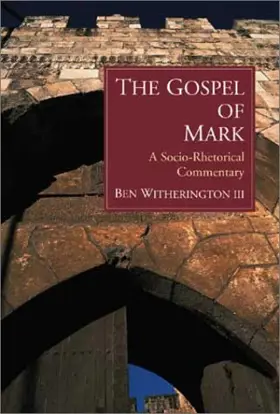

The Gospel of Mark: A Socio-Rhetorical Commentary
in Socio-Rhetorical Commentary
Pages
463
Publisher
Eerdmans
Published
2001
ISBN-13
9780802845030
Reviews
Solid commentary. I consulted his commentary regularly while preaching through the Gospel of Mark.
A solid evangelical commentary by a prominent New Testament scholar. As the subtitle notes, this commentary focuses on (1) the social setting of the story and the social setting of the audience (Witherington believes it was written to Roman Christians in the late 60’s) and (2) the rhetorical literary argument of the narrative. The commentary is strong on both accounts.
[Full Review]
I have found Witherington's "socio-rhetorical" commentaries to be a mixed bag. Some are much better than others. This commentary on the Gospel of Mark is one of his best.
[Full Review]
Ben Witherington III, professor of New Testament at Asbury Theological Seminary, continues his sociorhetorical commentaries with this edition on the Gospel of Mark. His emphasis is not upon a word-by-word exegesis but on the flow of the narrative, placing Mark in its first-century social setting as well as bridging the gap (his term) between the first and twenty-first centuries. Witherington�s intro duction deals with several issues surrounding genre, social context, and theology. As far as genre is concerned, Witherington makes a good case for classifying Mark as ancient bios literature. Several reasons are given: (1) Mark is the right length; (2) the work is clearly a continuous prose narrative; (3) Jesus is almost always at the center of the narrative; (4) Mark uses indirect portraiture to reveal the central character; (5) chreia is the rhetorical device of choice; (6) Jesus is the right kind of subject for this genre; and (7) the rough Greek in Mark is not unlike popular bioi. The rhetoric of Mark is classified as chreia, an elementary form of rhetoric defined by Witherington as �a concise �recollection� with a specific focus and source� (12). The author is convinced that Mark has rhetorical aims throughout the Gospel, namely, to view Jesus as he is described in 1:1 as the Christ and Son of God.
[Full Review]
It would be a glaring understatement to describe Ben Witherington, Professor of NewTestament Interpretation at Asbury Theological Seminary, as merely a prolific writer.The Gospel of Mark: A Socio-Rhetorical Commentary is one of two rather substantialbooks published by Witherington in 2001 and the author’s fourth full-length commentaryon a New Testament text. While the lively tempo of Witherington’s literary productionmight be impressive and even heartening to some, others will find it suspect, wonderingwhether he in fact has anything especially significant or innovative to contribute tocontemporary debates in the critical study of the New Testament.Witherington’s commentary represents a thoroughly traditional and predictablyconservative treatment of the Gospel of Mark. It seems ironic that he begins with areference to Chad Myers’s Binding the Strong Man, in which Myers describes Mark as asubversive Gospel, because the commentary demonstrates an understanding of Mark thatis anything but subversive. In spite of the implication that Witherington wants to makeuse of more contemporary interpretive methodologies (e.g., as one can see from thebook’s subtitle) and his pointed attempts in the introduction to engage critically certaintheoretical positions with which he strongly disagrees, he remains ultimately a championof conventional and long-standing readings of Mark and does little to unsettlecommonplace glosses of the text.
[Full Review]



